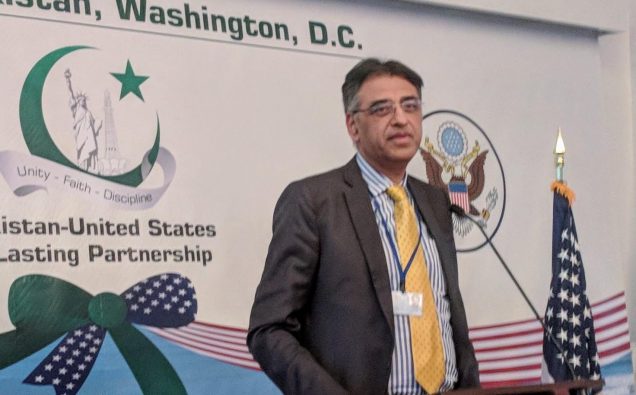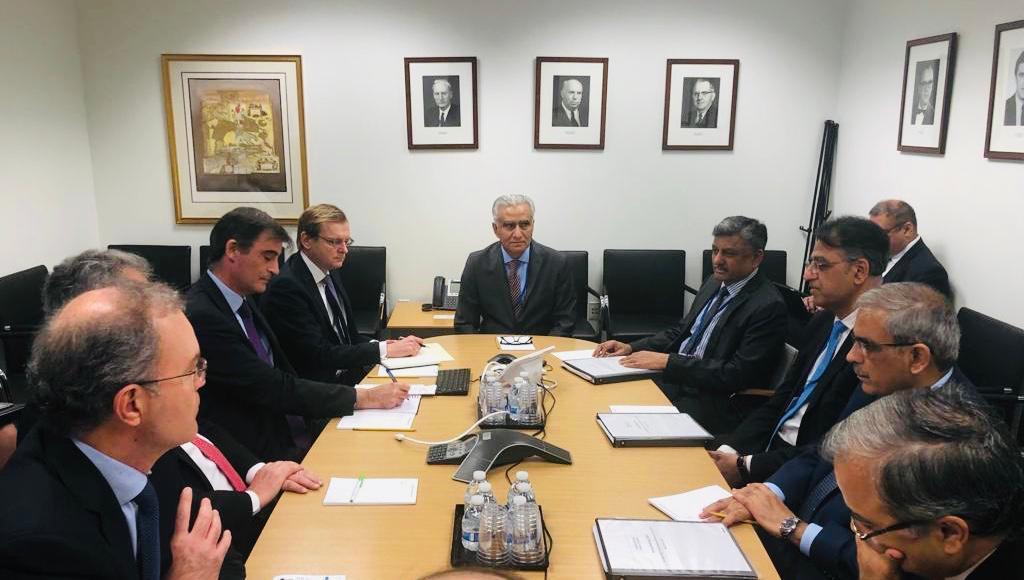
Finance Minister Asad Umar said Pakistan and International Monetary Fund have almost reached a deal in principle on a bailout package as Islamabad strives for a fix to the balance of payment crisis amid ballooning trade deficit, currency devaluation and eroding confidence.
“After two days of negotiations (with IMF officials), I can say we have almost agreed in principle (on the credit package),” Umar told Washington-based Pakistani journalists.
The finance minister, who is here for the annual IMF-World Bank Spring meetings, said there is just one issue to be addressed during negotiations with the Fund and hoped it would be done during his remaining meetings.
Following up on deliberations in D.C., an IMF mission will visit Pakistan to formalize the deal. The two sides have not yet disclosed the size of the deal being finalized but it is expected to be a big package to bail Pakistan out of the financial crisis.
Speaking earlier to a gathering of Pakistani-Americans at the country’s embassy, Umar said Prime Minister Imran Khan’s government has long believed that it would introduce structural economic reforms and perform just in the interest of the country.
Umar, who is also facing domestic criticism for the government’s inability to deal with the financial troubles early enough, defended the Khan government’s seeking support from friendly countries and delaying the IMF bailout package.
“We have always said we will do what is good for the country, and the IMF deal that we had earlier would not have served us well.”
At the same time, he wondered if the new deal with the IMF would be the last one the country seeks. The finance minister acknowledged that Pakistan’s economy faced structural problems as evidenced by a dozen IMF deals the country had to enter into as a way to resolve repeated financial crises over the past several decades.
He also blamed “fake news” for poor perceptions of the economy.
Umar, who had a successful career in the private sector before joining Pakistan Tehreek -e- Insaf, said the Khan Government is committed to making Pakistan part of the $70 trillion economy.
The finance minister brushed aside suggestion that he was on the verge of leaving the government.
Responding to a question about Pakistan’s efforts to fulfill its obligations to stop illegal flow of terrorism funding under FATF, finance minister said Islamabad remains committed to doing that but pointed out that India has been thwarting acknowledgement of its progress at Financial Action Task Force. Indian officials, he said, are on record to oppose recognition of Pakistan’s steps.
On regional trade, Asad Umar said Pakistan has discussed advancing trade with Afghanistan and Central Asian countries. As for India, Umar said, India has taken an extreme political position on the issue as it holds elections and hoped that the new government that comes into power after elections will hold talks on all outstanding issues as well as commerce between the two countries.















[…] the midst of negotiating a bailout deal with the International Monetary Fund, Pakistan’s government suddenly finds itself is in search of a new finance minister after […]